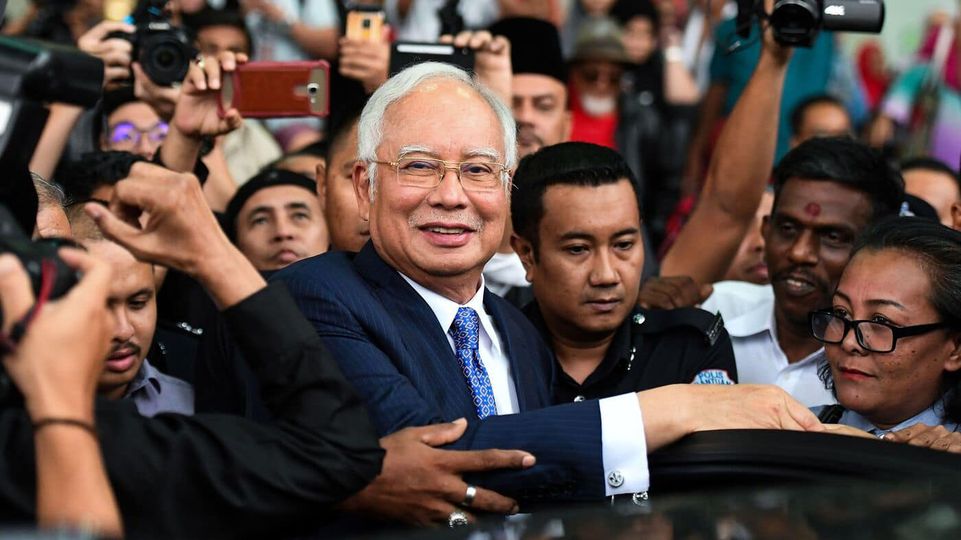MALAYSIA’s Pardons Board said Friday it cut in half the 12-year prison sentence of former Prime Minister Najib Razak who is incarcerated for corruption, a move analysts said could raise doubts about the sincerity of the Anwar Ibrahim government’s anti-graft campaign.
Najib, whose sentence would end Aug. 23, 2028, under the decision, also saw the board drastically reduce the fine the court imposed on him after he was found guilty in July 2020 of illegally receiving 42 million ringgit (U.S. $9.4 million) in a 1MDB-linked case.
“After considering opinions and advice, the 61st Kuala Lumpur, Labuan and Putrajaya Federal Territories Pardon Board Meeting has decided on the punishment for … Mohd Najib bin Tun Haji Abdul Razak,” the board’s statement said, adding his sentence was reduced by 50%.
The Pardons Board lowered his fine to 50 million ringgit ($10.5 million) from 210 million ringgit ($44 million).
The board’s statement did not explain the rationale behind granting what amounts to a partial royal pardon, but noted that the former prime minister would be required to serve another year in prison if he fails to pay the fine. But it didn’t specify when Najib had to pay the fine either.
It also did not refer to the possibility of parole, which would allow Najib to end his incarceration earlier than in August 2028.
Najib could become eligible for release next year according to Malaysia’s Prisons Act, which allows prisoners to seek parole after completing half of their sentences. This means the 70-year-old politician would be able to apply for parole of his revised six-year term by the end of 2025.
“The parole process might itself take some time, but given how fast his pardon process went, it would be no surprise,” criminal lawyer Goh Cia Yee told BenarNews.
The Pardons Board decided on Najib’s pardon application on Monday during King Sultan Abdullah Sultan Ahmad Shah’s last days on the throne. The king has the discretion to allow or disallow a pardon application.
The Kuala Lumpur High Court in 2020 convicted Najib of one count of abuse of power, three counts of criminal breach of trust, and three counts of money laundering for illegally receiving money from SRC International, a unit of the looted sovereign wealth fund 1MDB.
In an interview on Friday, Anwar said he respected the board’s decision, noting that it is beyond the purview of the prime minister or the government.
“The king, as the constitutional monarch, consults the attorney general, the prime minister and many [others]. All considerations have been taken into account by the then-king,” Anwar told Al-Jazeera Arabic.
“Whatever one feels, of course it is very political, some support, some don’t. But they cannot ignore the fact that you must respect the rights of everyone convicted to appeal to the pardons board.”
Najib, who is a senior leader of the United Malays National Organization (UMNO), became the first former or current prime minister of Malaysia to be incarcerated. The country’s highest court had in August 2022 upheld his conviction from two years earlier and ordered he be sent to prison.
Meanwhile, UMNO decided to support its old foe, Anwar’s Pakatan Harapan alliance, in a federal coalition government in November 2022 after the general election failed to produce a clear winner.
Najib remains on trial in separate cases directly linked to 1MDB, a state fund he set up to spur the economy, including one connected with 2.3 billion ringgit (U.S. $487 million) that allegedly went missing from 1MDB and into the ex-PM’s accounts.
Investigators estimate that more than $4.5 billion was plundered from 1MDB, or 1 Malaysia Development Berhad, through fraudulent shell companies to corrupt government and bank officials and their associates.
Prime Minister Anwar, who for years opposed Najib’s UMNO government, had been sentenced to prison in 2015 on sodomy charges and received a royal pardon in 2018.







